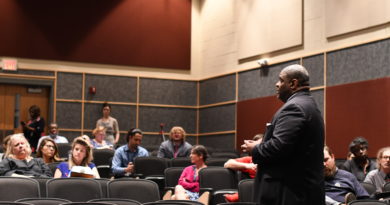Advisement adjusts to new MyJags program
Formerly a separate weekly period on Wednesdays, advisement was a time for students to catch up on work after other administrative tasks were done. Students also had general and grade-level specific lessons, giving a small academic break during the middle of the week. Students also watched the WJAG-TV school news and received important information about events/clubs.
Although last year’s model of advisement sounds good in theory, it had its problems practically for both individual teachers, administration, and students.
“Some students would disobey their teacher. Some would walk out of class without permission because they thought it’s a free period, ” said Sue Odeyemi, 10th grade.
“It [advisement] was hectic at times,” said Anthony Manzione, 10th grade. During almost every advisement there were disruptions.
“Many teachers received disrespect in during that time,” said Odeyemi. Although some students did use that time for getting work done, others used it as free time.
“We had a large problem with students skipping. The class didn’t count as a grade, so people didn’t take as seriously as they should have,” said Mr. Joshua Sampson, English department.
When this school year began, many students wondered “What happened to advisement?” on the second day of school when they were told to stay in their 4th period classrooms.
Students were confused because they were not told who their advisor would be. Students later found out that advisement would be conducted through their 4th period. This year, instead of going to a different teacher students stay in their 4th period class on Wednesdays, and for scheduling, advising, and conference purposes, students will see their newly dubbed “JagMother.”
Many students had an advisor who was not already one of their teachers. When parent conference time came around in October and February, teachers held conferences with students they sometimes barely knew.
“In the past, a lot of the advisement kids’ teachers didn’t teach them during the day, so they never had them as students. The current model has every MyJags student have an advisement teacher that they see in class during some part of the day,” said Sampson. “They know their current advisor a little better and the advisors know the student better. Most teachers and students have already created some sort of bond. If the students are more familiar and comfortable with the teacher that is going to be sitting in a conference with their parents, the student will open up and be more honest.”
Also, many teachers had to schedule conferences for 30 or more students, creating a burden on teachers.
“It was a lot of stress. I’ve been one of those teachers that had to schedule those 32 conferences. It seems like you have a lot of time, but you really don’t. Most parents also wanted conferences after 5 o’clock, and we only had one late day for conferences,” said Sampson.
With the model of advisement last year, there were some teachers that didn’t even have advisement students.
“You become a bit resentful of the teachers that don’t have to do it [conferences] or of those teachers with an advisement of 5-10 students. You’re doing more work than they are,” said Sampson.
Students will not feel like much has changed, but they will be impacted. Sampson expects the new model to be more personal and streamlined.
“I don’t think they’ll notice that much. It is not going to be a big huge thing. The students won’t meet as a class. For the students, it’ll be just the two conferences. Every now and then your JagMother will be asking you some questions about your transcript and have you look at some things,” said Sampson.
The expectations for this new model, MyJags, is to mainly benefit the students and teachers.
“I’m hoping that if all the teachers in the building are more involved with scheduling students. They have a smaller group to really pay attention to, so next year’s schedule can be much more accurate. We offer the classes that students want more, and on the first day of school they will be in the classes that they want to be in. That’s my main goal,” said Sampson.




